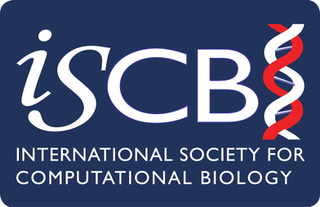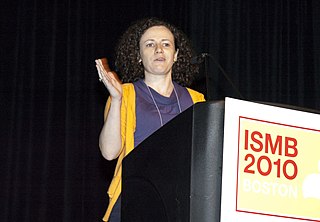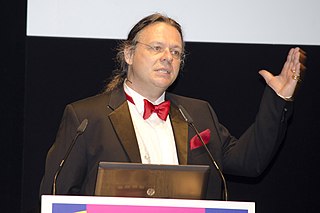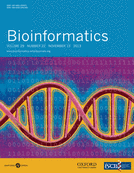
Intelligent Systems for Molecular Biology (ISMB) is an annual academic conference on the subjects of bioinformatics and computational biology organised by the International Society for Computational Biology (ISCB). The principal focus of the conference is on the development and application of advanced computational methods for biological problems. The conference has been held every year since 1993 and has grown to become one of the largest and most prestigious meetings in these fields, hosting over 2,000 delegates in 2004. From the first meeting, ISMB has been held in locations worldwide; since 2007, meetings have been located in Europe and North America in alternating years. Since 2004, European meetings have been held jointly with the European Conference on Computational Biology (ECCB).

The International Society for Computational Biology (ISCB) is a scholarly society for researchers in computational biology and bioinformatics. The society was founded in 1997 to provide a stable financial home for the Intelligent Systems for Molecular Biology (ISMB) conference and has grown to become a larger society working towards advancing understanding of living systems through computation and for communicating scientific advances worldwide.

Lawrence E. Hunter is a Professor and Director of the Center for Computational Pharmacology and of the Computational Bioscience Program at the University of Colorado School of Medicine and Professor of Computer Science at the University of Colorado Boulder. He is an internationally known scholar, focused on computational biology, knowledge-driven extraction of information from the primary biomedical literature, the semantic integration of knowledge resources in molecular biology, and the use of knowledge in the analysis of high-throughput data, as well as for his foundational work in computational biology, which led to the genesis of the major professional organization in the field and two international conferences.
The ISCB Overton Prize is a computational biology prize awarded annually for outstanding accomplishment by a scientist in the early to mid stage of his or her career. Laureates have made significant contribution to the field of computational biology either through research, education, service, or a combination of the three.
The ISCB Accomplishment by a Senior Scientist Award is an annual prize awarded by the International Society for Computational Biology for contributions to the field of computational biology.
Trey Ideker is a professor of medicine and bioengineering at UC San Diego. He is the Director of the National Resource for Network Biology, the San Diego Center for Systems Biology, and the Cancer Cell Map Initiative. He uses genome-scale measurements to construct network models of cellular processes and disease.

Olga G. Troyanskaya is an American scientist. She is Professor in the Department of Computer Science and the Lewis-Sigler Institute for Integrative Genomics at Princeton University and the Deputy Director for Genomics at the Flatiron Institute's Center for Computational Biology in New York City. She studies protein function and interactions in biological pathways by analyzing genomic data using computational tools.

The International Society for Computational Biology Student Council (ISCB-SC) is a dedicated section of the International Society for Computational Biology created in 2004. It is composed by students from all levels in the fields of bioinformatics and computational biology. The organisation promotes the development of the students' community worldwide by organizing different events including symposia, workshops, webinars, internship coordination and hackathons. A special focus is made on the development of soft skills in order to develop potential in bioinformatics and computational biology students around the world.

The European Conference on Computational Biology (ECCB) is a scientific meeting on the subjects of bioinformatics and computational biology. It covers a wide spectrum of disciplines, including bioinformatics, computational biology, genomics, computational structural biology, and systems biology. ECCB is organized annually in different European cities. Since 2007, the conference has been held jointly with Intelligent Systems for Molecular Biology (ISMB) every second year. The conference also hosts the European ISCB Student Council Symposium. The proceedings of the conference are published by the journal Bioinformatics.

Chris Sander is a computational biologist based at the Dana-Farber Cancer Center and Harvard Medical School. Previously he was chair of the Computational Biology Programme at the Memorial Sloan–Kettering Cancer Center in New York City. In 2015, he moved his lab to the Dana–Farber Cancer Institute and the Cell Biology Department at Harvard Medical School.

Burkhard Rost is a scientist leading the Department for Computational Biology & Bioinformatics at the Faculty of Informatics of the Technical University of Munich (TUM). Rost chairs the Study Section Bioinformatics Munich involving the TUM and the Ludwig Maximilian University of Munich (LMU) in Munich. From 2007-2014 Rost was President of the International Society for Computational Biology (ISCB).

David Sankoff is a Canadian mathematician, bioinformatician, computer scientist and linguist. He holds the Canada Research Chair in Mathematical Genomics in the Mathematics and Statistics Department at the University of Ottawa, and is cross-appointed to the Biology Department and the School of Information Technology and Engineering. He was founding editor of the scientific journal Language Variation and Change (Cambridge) and serves on the editorial boards of a number of bioinformatics, computational biology and linguistics journals. Sankoff is best known for his pioneering contributions in computational linguistics and computational genomics. He is considered to be one of the founders of bioinformatics. In particular, he had a key role in introducing dynamic programming for sequence alignment and other problems in computational biology. In Pavel Pevzner's words, "Michael Waterman and David Sankoff are responsible for transforming bioinformatics from a ‘stamp collection' of ill-defined problems into a rigorous discipline with important biological applications."

Ron Shamir is an Israeli professor of computer science known for his work in graph theory and in computational biology. He holds the Raymond and Beverly Sackler Chair in Bioinformatics, and is the founder and former head of the Edmond J. Safra Center for Bioinformatics at Tel Aviv University.

Alfonso Valencia is a Spanish biologist, ICREA Professor, current director of the Life Sciences department at Barcelona Supercomputing Center, of Spanish National Bioinformatics Institute (INB-ISCIII), and coordinator of the data pillar of the Spanish Personalised Medicine initiative, IMPaCT. From 2015 to 2018, he was President of the International Society for Computational Biology.

Gary Stormo is an American geneticist and currently Joseph Erlanger Professor in the Department of Genetics and the Center for Genome Sciences and Systems Biology at Washington University School of Medicine in St Louis. He is considered one of the pioneers of bioinformatics and genomics. His research combines experimental and computational approaches in order to identify and predict regulatory sequences in DNA and RNA, and their contributions to the regulatory networks that control gene expression.

Ziv Bar-Joseph is an Israeli computational biologist and Professor in the Computational Biology Department and the Machine Learning Department at the Carnegie Mellon School of Computer Science.
The ISCB Innovator Award is a computational biology prize awarded annually to leading scientists who are within two decades post-degree, who consistently make outstanding contributions to the field, and who continue to forge new directions. The prize was established by the International Society for Computational Biology (ISCB) in 2016 and is awarded at the Intelligent Systems for Molecular Biology (ISMB) conference. The inaugural recipient was Serafim Batzoglou.
ISCB Fellowship is an award granted to scientists that the International Society for Computational Biology (ISCB) judges to have made “outstanding contributions to the fields of computational biology and bioinformatics”. As of 2019, there are 76 Fellows of the ISCB including Michael Ashburner, Alex Bateman, Bonnie Berger, Steven E. Brenner, Janet Kelso, Daphne Koller, Michael Levitt, Sarah Teichmann and Shoshana Wodak. See List of Fellows of the International Society for Computational Biology for a comprehensive listing.
Mona Singh is an American computer scientist and an expert in computational molecular biology and bioinformatics. She is the Wang Family Professor in Computer Science in the Lewis-Sigler Institute for Integrative Genomics and the Department of Computer Science at Princeton University. Since 2021, she has been the Editor-in-Chief of the Journal of Computational Biology.













